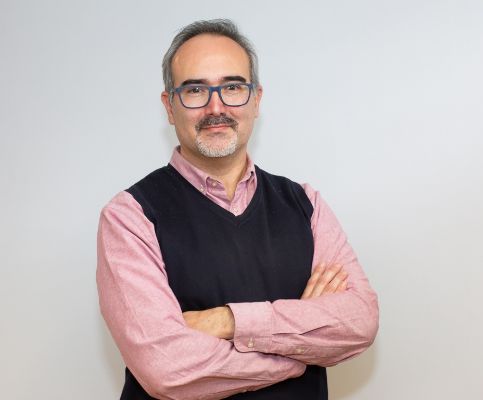

JUAN JOSE VILLALON OGAYAR
DECANO/A FACULTAD CC. POLÍTICAS Y SOCIOLOGÍA
VOCAL CONSEJO EDITORIAL CC SOCIALES Y JURIDICAS
PROFESOR PERMANENTE LABORAL
SOCIOLOGÍA III (TENDENCIAS SOCIALES)
FAC.CIENCIAS POLÍTICAS Y SOCIOLOGÍA
(+34) 91398-8639
Academic Information
Degree in Political Science and Sociology (Sociology Section) Faculty of Political Science and Sociology of the University of Granada 1997
Specialist in Applied Social Research and Data Analysis Sociological Research Center 1999
European Doctor in Political Science and Sociology Faculty of Political Science and Sociology of the National University of Distance Education 2006
Academic positions held
Professor Doctor in the area of Sociology since 2010
Research activity
My research career began in 2000 with the Study Group on Social Trends (GETS) of the UNED, around the problem of exclusion and social inequalities. It was based on a socio-historical perspective learned from scholars such as G. Therborn and J.F. Tezanos. It was focused on the investigation of structural and cultural trends of state societies. Until 2010 I participated in more than 20 research projects and contracts. Of these, three were competitive R&D projects. And, the rest, contracts with private and public entities (Ramón Areces Foundation, FUNCAS, FOESSA, ONCE and INJUVE). I wrote in more than 15 research publications and more than 15 contributions to international and national Congresses.
En ese tiempo, mi trabajo se centró en la investigación de las formas de identificación social en las sociedades contemporáneas en un contexto de “crisis expresiva” que J.F. Tezanos había comprendido o descubierto ya en el año 2001. Llegué hasta el año 2009. Entonces, me introduje en la diversidad de formas de gestión de las identidades sociales que se producía en las Comunidades Autónomas. Y, sospeché que el nivel “nacional”, la metodología cuantitativa, y el concepto “clase social” no era una buena base para estudiar las formas de identificación.
In 2010, I focused the study of social identification on cities. I was still looking to understand the connection between position and social identification, but I wanted to study it at micro levels. With the support of GETS, I was IP of the CSO2011-32121 project that lasted until 2015. In that project, I discovered the importance of the local in the formation of social identities, the internal division of the city and the formation of local barriers that isolate, stigmatize and marginalize. By kicking the city, I discovered the individual as a subject positioned within the structural and cultural boundaries in which he lives. And I had doubts about: the limits of the "city" and the "neighborhood", the way in which territorial stigmas are constructed, the strategies that are developed to overcome them and the social agents that influence the action. I came face to face with the "social experience" that modulates the relationship between position and identifying practice. The project, as planned, was a failure. It started from purely structuralist erroneous premises that tried to shrink the individual subject with tools such as an almost closed questionnaire to know about the form of social identification of the subject. Even so, the fieldwork served to break all these epistemological prejudices and transform the research towards a new constructivist structural proposal that found in P. Bourdieu the right concepts to evolve and that I had met at the University of Sheffield, together with R. Jenkins, in 2005.
From the theory of fields, a vision has emerged where the individual appears as a polyhedron in a multidimensional environment, more as a matrix than as a point in space, and social experience gains strength in the face of the transitory position in the formation of practices. With those wickers, I entered another practice: crime. He appeared before me as I looked at urban inequalities. And I found the islands of exclusion that in the 90s M. Castells named. Then, L. Wacquant and his Regime of Advanced Urban Marginality came to me. Also, I found the work of many researchers in urbanism and sociology to locate vulnerable neighborhoods in Spain. And, I understood the connection between one and the other thanks to J. Alguacil and J. Camacho, as well as A. Hernandez Aja. And, after reviewing his work and that of many other colleagues, as well as the initiatives that have been developed to reverse the social situation of many of these spaces of exclusion in Europe and in Spain, I have come to propose this project with the idea of, not only improve our knowledge about the most vulnerable neighborhoods, but also, to improve the forms of diagnosis and socio-urban intervention in these areas where a large part of the most disadvantaged population of our cities live and with which we must count for the integration of these areas.
The lines of research that I maintain are: stratification in large cities, urban exclusion, the process of individualization, the management of basic social identities, the explanation of crime as habitus and the control of urban violence.
Educational management experience
Since 2019 I am the vice-dean of academic planning and new degrees, and, first vice-dean of the Faculty of Political Science and Sociology.
Previously I acted as Coordinator of Face-to-Face Exams of the UNED, linked to the General Secretariat of the University for two years. Previously, I was secretary of the Faculty of Political Science and Sociology for four years under the tenure of two deans. And, even before, I was assistant secretary of the same faculty for another two years, back in 2006.
Teaching
Asignaturas de Grado:
- 66044157 - PRACTICUM DEL GRADO EN CRIMINOLOGÍA
- 6604203- - DELINCUENCIA Y VULNERABILIDAD SOCIAL
- 66044140 - TRABAJO DE FIN DE GRADO EN CRIMINOLOGÍA
- 69023144 - CIUDAD: RELACIONES SOCIALES Y ESPACIO FÍSICO
- 69024066 - SOCIOLOGÍA URBANA
- 69024043 - TRABAJO FIN DE GRADO (SOCIOLOGÍA)
- 66034041 - TRABAJO FIN DE GRADO (TRABAJO SOCIAL)
Asignaturas de Máster:
- 29902042 - HISTORIOGRAFÍA COMO MÉTODO DE INVESTIGACIÓN
Programas de Doctorado:

N.º de tramos reconocidos de evaluación docente
4Research
INVESTIGATION GROUPS
- GRUPO DE ESTUDIOS SOBRE SOCIEDAD Y POLÍTICA (UCM-UNED) El Grupo de Investigación de Estudios sobre Sociedad y Política (GESP) está formado por investigadoras e investigadores de las Facultades de Sociología y Ciencias Políticas de la Universidad Nacional de Educación a Distancia (UNED), de la Universidad Complutense de Madrid (UCM) y de otras universidades españolas. Ha sido reconocido por ambas Universidades como Grupo Consolidado de Investigación, y se conforma como un colectivo estable para la realización de tareas en el ámbito de la investigación sociopolítica. En el seno del Grupo se llevan a cabo actividades conjuntas de sus miembros y acciones de algunos de ellos que se presentan en común periódicamente para enriquecimiento del conjunto.Descripción de varias líneas sobre el grupo de investigación. Enlace a la web del grupo
- SEGUNDO GRUPO DE INVESTIGACIÓN Intentar seguir la misma línea en la descripción de todos los grupos
PROYECTOS DE INVESTIGACIÓN
- Básic Identities and Economic Crisis" CSO2011-32121 +info
- INMIGRACIÓN Y CONDICIONES DE TRABAJO Entidad financiadora: Instituto Nacional de Seguridad e Higiene en el Trabajo
- DISEÑO DE OBSERVATORIO SOBRE EL CAMBIO ORGANIZATIVO Y TECNOLÓGICO EN LAS EMPRESAS Y SUS EFECTOS SOBRE LA SALUD Y LAS CONDICIONES DE TRABAJO Proyectos I+D+I Entidad financiadora: Ministerio de Trabajo y Asuntos Sociales
- TENDENCIAS DE EXCLUSIÓN SOCIAL Y NUEVOS SISTEMAS DE ESTRATIFICACIÓN EN LAS SOCIEDADES TECNOLÓGICAS AVANZADAS. EL CASO DE ESPAÑA. Proyecto CICYT sec97-1256) Entidad financiadora: Comisión Interministerial de Ciencia y Tecnología
Publications
- PUBLICACIONES EN LÍNEA Ir a Google Scholar
-
PUBLICACIONES RECIENTES
Co-author: Smagacz-Poziemska M., Gómez M.V., Pereira P., Guarino L., Kurtenbach S., Villalón J.J. (2020) Cities as the Strategic Terrain of Research on Contemporary Inequalities and Uncertainty. In: Smagacz-Poziemska M., Gómez M., Pereira P., Guarino L., Kurtenbach S., Villalón J. (eds) Inequality and Uncertainty. Palgrave Macmillan, Singapore. https://doi.org/10.1007/978-981-32-9162-1_1
Co-editor: Smagacz-Poziemska M., Gómez M., Pereira P., Guarino L., Kurtenbach S., Villalón J. (eds) (2020) Inequality and Uncertainty. Palgrave Macmillan, Singapore. English ISBN: 978-981-32-9161-4
Book: Villalón Ogáyar, Juan José (2019) Lugares vulnerables, violencias y delincuencia. Editorial UNED, Universidad Nacional de Educación a Distancia. ISBN 9788436275384
Co-author: Ferro L., Smagacz-Poziemska M., Gómez M.V., Kurtenbach S., Pereira P., Villalón J.J. (2018) Moving Cities: Contested Views on Urban Life. In: Ferro L., Smagacz-Poziemska M., Gómez M., Kurtenbach S., Pereira P., Villalón J. (eds) Moving Cities – Contested Views on Urban Life. Springer VS, Wiesbaden. https://doi.org/10.1007/978-3-658-18462-9_1
Co-editor: Ferro L., Smagacz-Poziemska M., Gómez M., Kurtenbach S., Pereira P., Villalón J. (eds) (2018) Moving Cities – Contested Views on Urban Life. Springer VS, Wiesbaden. ISBN: 9783658184612
Journal: Villalón, J.J. (2016) Researching social stratification in large urban zones today in Joao Teixeiras (ed.) Research in Urban Sociology, Ed. Emerald Press. Book Series: Research in Urban Sociology Series ISSN: 1047-0042 Series editor(s): Dr Ray Hutchison Subject Area: Sociology
Journal: Villalón Ogáyar, J.J. (2016) La gestión de las identidades sociales por la juventud de la era de las TIC: el fortalecimiento de los vínculos incorpóreos en Revista de Estudios de Juventud, ISSN-e 0211-4364, Nº. 111, págs. 155-173
Chapter: Villalón, J.J. (2015) Limitaciones a la integración social y a la ciudadanía universal en la ciudad del siglo XXI en Sandra Olivero Guidobono y José Luis Caño Ortigosa (coords.) “Temas Americanistas: Historia y diversidad cultural”, Universidad de Sevilla, ISBN 978-84-472-1604-8, págs. 573-584.
Journal: Villalón J.J. (2013) Grandes Áreas Urbanas: Conflictos postindustriales y retos políticos en Documentación Social. Revista de estudios sociales y de sociología aplicada, nº 171, ISSN 0417-8106.
Chapter: Villalón, J.J. (2012) "Nuevas formas de identificación social e inmigración: Discusión en torno a la Agenda Europea para la Integración de los Nacionales de Terceros Países" en Tezanos (ed.) Los nuevos problemas sociales. Duodécimo Foro sobre tendencias sociales. Editorial Sistema. ISBN 978-84-86497-84-2, págs. 481-518.
Co-author Book: Tezanos, J. F., Villalón, O. J. J., Quiñones, A., (Grupo de Estudio sobre Tendencias Sociales) (2011). Estudios Delphi sobre tendencias económicas, sociales y políticas. Madrid: Editorial Sistema. ISBN: 978-84-86497-81-1
Co-author Chapter: Camacho Grande, J. M. Villalón Ogáyar J. J. (2010) “Indicadores básicos de España (1975-2009)” en España: una sociedad en cambio / coord. por Salustiano del Campo Urbano, José Félix Tezanos Tortajada, ISBN 978-84-9940-176-8, págs. 411-430
Co-author Chapter: José Félix Tezanos Tortajada, María Rosario Sánchez Morales, Verónica Díaz Moreno, Juan José Villalón Ogáyar (2010) “Estudio Delphi sobre tendencias internacionales” en Incertidumbres, retos y potencialidades del siglo XXI: grandes tendencias internacionales: undécimo Foro sobre tendencias sociales / coord. por José Félix Tezanos Tortajada, ISBN 978-84-86497-78-1, págs. 161-214
